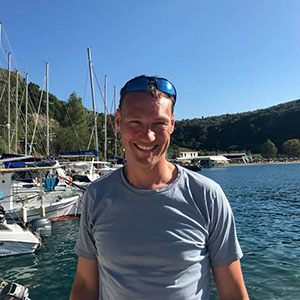Richard is the Head of Policy and Public Affairs, Scotland for Marie Curie. Marie Curie is a charity that provides care and support for people living with a terminal illness. Last year it directly supported over 8,600 patients. Richard graduated from the University of Stirling in 2001 with a BA (Hons) History and Politics and is working to improve peoples' lives.
What do you like most about your current role at Marie Curie?
I have always been interested in helping and supporting people, but never had the aptitude or emotional resilience to work in front line services. I could never be a nurse or a social worker. However, I do understand politics and how public policy works and to be able to use those skills to try and bring about positive change for people is hugely rewarding.
What made you choose the third sector to work in?
I have spent most of my career in the third sector and I have always loved it. Charities are full of passionate, dedicated people who are working to help people who are often vulnerable and in need of support, sometimes facing the most difficult periods of their lives.
Charities can and do make a difference to these people, and often life-changing differences. To be even a small part of that is hugely rewarding.
How do you use the experience you gained at the University of Stirling in your current role and throughout your career?
I immersed myself in University life and it that made a huge difference in helping me get on the career ladder, as well as to progress. I studied History and Politics, which was very useful, especially in developing my research and writing skills. I also learned how to craft arguments both for essays and presentations.
During my spare time I was involved in student politics and took on a number of roles in the Union, eventually being elected Vice President and Treasurer. I was also involved in the Drama Society, as President, which gave me the opportunity to produce plays and even organise a Scottish-wide one-act play festival.
Having experience of leading groups, managing events, projects and budgets were all things that employers were keen to hear about when I was applying for jobs.
What have been your career highlights?
Last year I led a joint Marie Curie and MND Scotland campaign to change the definition of terminal illness in the new Social Security (Scotland) Act. At current to be considered as terminally ill you have to be deemed to be in the last six months of life before you can access welfare benefits quickly and without unfair assessments. This has meant a lot of people who are terminally ill who may live slightly longer than six months or those who it isn’t clear how long they might live, have been unable to access any welfare benefits. We convinced the Government to have a definition that allows clinicians to decide when someone is terminally ill and not when they are just in the last six months of their life. This could lead to many terminally ill people in Scotland getting the benefits they need quickly and in a much more dignified way.
What did you enjoy about your time at the University of Stirling? What are your favourite memories?
I have so many fond memories of Stirling and was lucky to experience lots of different things from playing in the one of the University Football Teams for a season, being in and putting on plays (something I have not had the chance to do since leaving Uni!). Not to mention all the fun of the Union bars and nightlife, and just generally campus life. Stirling genuinely was a community.
If you could give current University of Stirling students’ one piece of advice, what would it be?
Get the most out of your University time. Getting a degree is important, but learning new skills, trying different things, and rounding your university experience will most definitely help give you an edge when applying for jobs once you graduate.
Where do you hope to be in five years’ time?
To be honest I am not sure, perhaps exactly where I am now. I have found as the years have gone on that it is important that career and life balance out. I have a job I love and challenges me every day. It fits nicely with all the other things I have going on in my life, including hobbies and family life.

